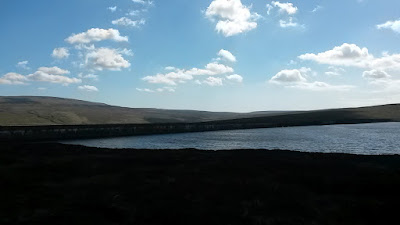The title of Rowan Williams' (former Archbishop of Canterbury) lecture last night at St James's Piccadilly was
Archaeological Warriors. He was talking about the destruction of holy sites in what he kept referring to as west Asia while meaning what I think of as the Middle East. He talked about people wanting to possess 'the title deeds' of history: possessing history means possessing identity. At the start he read part of a poem by James Fenton - which is now what I remember most about the lecture. It sums up part of Jerusalem to me....
“Jerusalem” by James Fenton
Stone cries to stone,
Heart to heart, heart to stone,
And the interrogation will not die
For there is no eternal city
And there is no pity
And there is nothing underneath the sky
No rainbow and no guarantee –
There is no covenant between your God and me.
It is superb in the air.
Suffering is everywhere
And each man wears his suffering like a skin.
My history is proud.
Mine is not allowed.
This is the cistern where all wars begin,
The laughter from the armoured car.
This is the man who won’t believe you’re what you are.
This is your fault.
This is a crusader vault.
The Brook of Kidron flows from Mea She’arim.
I will pray for you.
I will tell you what to do.
I’ll stone you. I shall break your every limb.
Oh, I am not afraid of you,
But maybe I should fear the things you make me do.
This is not Golgotha.
This is the Holy Sepulchre,
The Emperor Hadrian’s temple to a love
Which he did not much share.
Golgotha could be anywhere.
Jerusalem itself is on the move.
It leaps and leaps from hill to hill
And as it makes its way it also makes its will.
The city was sacked.
Jordan was driven back.
The pious Christians burned the Jews alive.
This is a minaret.
I’m not finished yet.
We’re waiting for reinforcements to arrive.
What was your mother’s real name?
Would it be safe today to go to Bethlehem?
This is the Garden Tomb.
No, this is the Garden Tomb.
I’m an Armenian. I am a Copt.
This is Utopia.
I came here from Ethiopia.
This hole is where the flying carpet dropped
The Prophet off to pray one night
And from here one hour later he resumed his flight.
Who packed your bag?
I packed my bag.
Where was your uncle’s mother’s sister born?
Have you ever met an Arab?
Yes, I am a scarab.
I am a worm. I am a thing of scorn.
I cry Impure from street to street
And see my degradation in the eyes I meet.
I am your enemy.
This is Gethsemane.
The broken graves look to the Temple Mount.
Tell me now, tell me when
When shall we all rise again?
Shall I be first in that great body count?
When shall the tribes be gathered in?
When, tell me, when shall the Last Things begin?
You are in error.
This is terror.
This is your banishment. This land is mine.
This is what you earn.
This is the Law of No Return.
This is the sour dough, this the sweet wine.
This is my history, this my race
And this unhappy man threw acid in my face.
Stone cries to stone,
Heart to heart, heart to stone.
These are the warrior archaeologists.
This is us and that is them.
This is Jerusalem.
These are dying men with tattooed wrists.
Do this and I’ll destroy your home.
I have destroyed your home. You have destroyed my home.
James Fenton
New Selected Poems (2006)




















